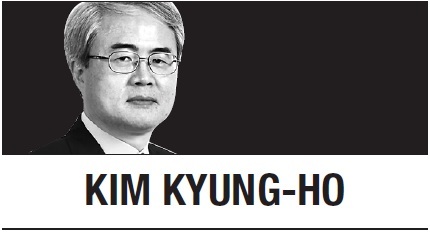Trade officials here were perplexed last week by a presidential spokesperson’s remarks dashing the possibility of South Korea taking China to the World Trade Organization for Beijing’s retaliation against Seoul’s hosting of an advanced US missile defense system.
The spokesman told a press briefing that South Korea would seek to strengthen strategic communication and cooperation with China to resolve “difficult issues” between the two sides. He said it was important to maintain cooperation with China in the face of mounting nuclear and missile threats from North Korea.
His comments came a day after the country’s top trade negotiator said Seoul was carefully considering suing China at the WTO.
Seoul’s repeated requests for China to lift retaliatory measures against South Korean businesses have fallen on deaf ears, with Beijing formally denying any deliberate reprisals regarding the deployment of the missile shield known as the Terminal High Altitude Area Defense system.
South Korean businesses have complained their government has remained too cautious in responding to Beijing’s economic retaliation that is driving or shutting them out of the Chinese market.
Excluding tit-for-tat measures, which are inconceivable on Seoul’s part, seeking WTO arbitration on China’s harassing of South Korean companies might be the only step it could take beyond repeating unheeded protests and pleas.
The prevailing view among legal experts here is that South Korea could win the suit as Beijing would probably be deemed to have violated rules on most-favored-nation treatment.
On the same day Trade Minister Kim Hyun-chong mentioned going to the WTO as a possible option, a government task force set up to deal with trade issues with China decided to step up preparations for taking legal action against Beijing’s measures seen to contravene international norms.
However, these signals of positive moves were dampened by the presidential spokesman’s remarks.
Seoul now seems empty-handed in coping with China’s economic retaliation, as Beijing is hardening its stance after additional launchers of the THAAD battery were installed early this month in response to North Korea’s sixth and most powerful nuclear test on Sept. 3.
It was hasty and far from strategic for the presidential office to rule out the possibility of taking China to the international trade arbitrator at this stage.
The trade minister’s remarks should have been understood as being aimed at putting more pressure on China from the standpoint of international standards rather than actually taking the step.
He said options up one’s sleeve “will no longer work as bargaining chips when you lay your cards on the table.”
What the hasty rebuff of trade officials’ assertive approach might show is the risk-averse tendency of President Moon Jae-in and his aides.
In a CNN interview last week, Moon said China would have difficulty changing its position on the THAAD issue in the run-up to the 19th congress of its ruling communist party that opens Oct. 18. He said he would restore ties with China in a steadfast way from a long-term perspective.
Moon expressed this forward-looking view although Chinese President Xi Jinping has refused to even have phone conversations with him to discuss the recent series of North Korean provocations.
Beijing seems to be delaying decisions on crucial external affairs until after the five-yearly meeting, which is expected to consolidate Xi’s grip on power and reshuffle the membership of key decision-making bodies.
China may ease its reprisals against the THAAD deployment because such retaliatory moves reinforce global skepticism toward its adherence to international norms and damage its own economy.
South Korean companies’ investment in China decreased 43.7 percent in the first seven months of the year, compared to moderate drops of 1.2 percent and 3.7 percent in investments by the EU and Japan, respectively, according to recent data from the Bank of Korea.
But skeptics say Beijing is likely to further harden its stance against the THAAD deployment, as Xi’s more authoritative rule in his second five-year term will strengthen China’s pursuit of regional hegemony.
The decision on whether to extend a bilateral currency swap deal with South Korea, which is scheduled to expire at the end of October, may be an early barometer of China’s course of action.
Concern has been raised here that China may refuse to extend the swap agreement to put more pressure on South Korea.
In the absence of similar arrangements with the US and Japan, the termination of the currency swap line with China could have a negative impact on South Korea’s financial market, which has remained relatively stable despite North Korea’s provocations.
BOK officials said the swap deal issue was not on the agenda of last week’s meeting here of central bank governors from South Korea, China and Japan.
It would have been better for the presidential office to wait for China’s future course of action to become more concrete before discarding the possibility of filing a suit to the WTO.
As suggested by some pundits here, South Korea could have raised the stakes further by signaling that it could consider withdrawing the market economy status for China.
Citing its unfair practices, most Western advanced economies have refused to grant such status to China as agreed on when China joined the WTO in 2001.
By Kim Kyung-ho
Kim Kyung-ho is the Sejong-based business editor of The Korea Herald. He can be reached at khkim@heraldcorp.com -- Ed.

![[AtoZ into Korean mind] Humor in Korea: Navigating the line between what's funny and not](http://res.heraldm.com/phpwas/restmb_idxmake.php?idx=645&simg=/content/image/2024/04/22/20240422050642_0.jpg&u=)

![[Exclusive] Korean military set to ban iPhones over 'security' concerns](http://res.heraldm.com/phpwas/restmb_idxmake.php?idx=645&simg=/content/image/2024/04/23/20240423050599_0.jpg&u=20240423183955)

![[Herald Interview] Why Toss invited hackers to penetrate its system](http://res.heraldm.com/phpwas/restmb_idxmake.php?idx=645&simg=/content/image/2024/04/22/20240422050569_0.jpg&u=20240422150649)
![[Graphic News] 77% of young Koreans still financially dependent](http://res.heraldm.com/phpwas/restmb_idxmake.php?idx=645&simg=/content/image/2024/04/22/20240422050762_0.gif&u=)